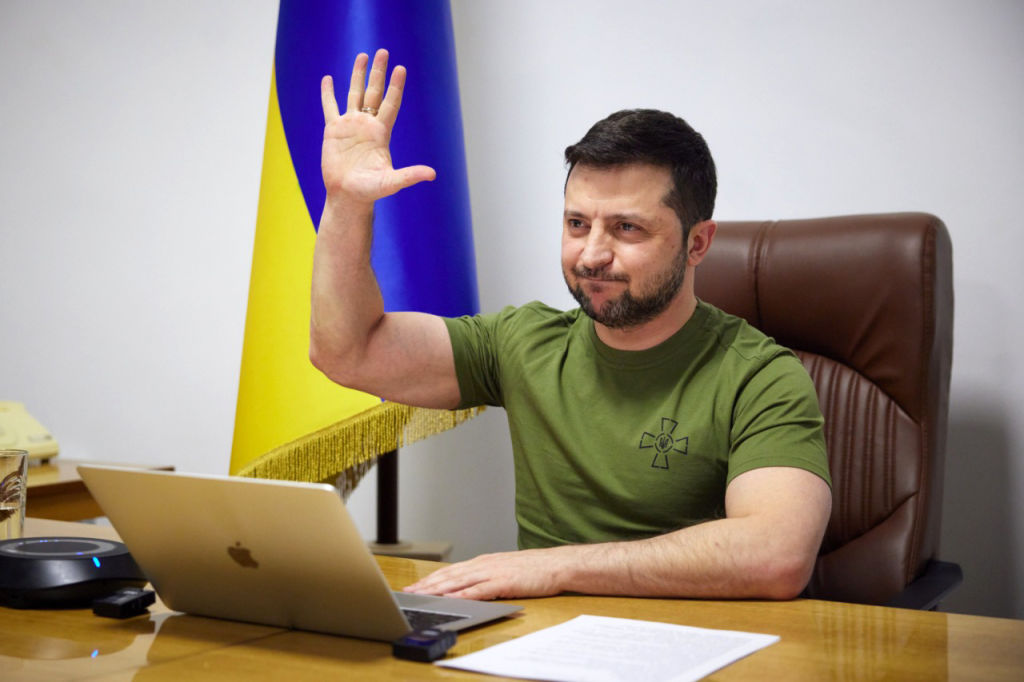Zelensky says repeating his requests to world leaders makes him 'feel like Bill Murray' in Groundhog Day


A free daily email with the biggest news stories of the day – and the best features from TheWeek.com
You are now subscribed
Your newsletter sign-up was successful
Like anyone in his position would be, Volodymyr Zelensky is tired of repeating himself.
In a wide-ranging interview with The Atlantic, the Ukrainian president lamented the repetitive nature of his many telephone, Zoom, and Skype calls with world leaders, who are often asking him the same questions about the ongoing Russian invasion.
"I like new questions," Zelensky told The Atlantic. "It's not interesting to answer the questions you already heard."
The Week
Escape your echo chamber. Get the facts behind the news, plus analysis from multiple perspectives.

Sign up for The Week's Free Newsletters
From our morning news briefing to a weekly Good News Newsletter, get the best of The Week delivered directly to your inbox.
From our morning news briefing to a weekly Good News Newsletter, get the best of The Week delivered directly to your inbox.
"When some leaders ask me what weapons I need, I need a moment to calm myself, because I already told them the week before," Zelensky continued. "It's Groundhog Day. I feel like Bill Murray."
Still, even when it seems he's living the same moment over and over, "[h]e says he has no choice but to keep trying," the Atlantic writes.
The world's leaders "are not against us," Zelensky said. "They just live in a different situation. As long as they have not lost their parents and children, they do not feel the way we feel."
Take the conversations he's had with soldiers in the decimated city of Mariupol, where 21,000 civilians have been killed so far, for example, the Atlantic writes.
A free daily email with the biggest news stories of the day – and the best features from TheWeek.com
"They say, 'We need help; we have four hours.' And even in Kyiv we don't understand what four hours are," Zelensky said. "In [Washington, D.C.] for sure they can't understand. However, we are grateful to the U.S., because the planes with weapons are still coming." Read more at The Atlantic.
Brigid Kennedy worked at The Week from 2021 to 2023 as a staff writer, junior editor and then story editor, with an interest in U.S. politics, the economy and the music industry.
-
 Samurai: a ‘blockbuster’ display of Japanese heritage
Samurai: a ‘blockbuster’ display of Japanese heritageThe Week Recommends British Museum show offers a ‘scintillating journey’ through ‘a world of gore, power and artistic beauty’
-
 BMW iX3: a ‘revolution’ for the German car brand
BMW iX3: a ‘revolution’ for the German car brandThe Week Recommends The electric SUV promises a ‘great balance between ride comfort and driving fun’
-
 Munich Security Conference: a showdown between Europe and Trump?
Munich Security Conference: a showdown between Europe and Trump?Today’s Big Question Report suggests European leaders believe they can no longer rely on the US for military support – but decoupling is easier said than done
-
 What would a UK deployment to Ukraine look like?
What would a UK deployment to Ukraine look like?Today's Big Question Security agreement commits British and French forces in event of ceasefire
-
 Would Europe defend Greenland from US aggression?
Would Europe defend Greenland from US aggression?Today’s Big Question ‘Mildness’ of EU pushback against Trump provocation ‘illustrates the bind Europe finds itself in’
-
 Is conscription the answer to Europe’s security woes?
Is conscription the answer to Europe’s security woes?Today's Big Question How best to boost troop numbers to deal with Russian threat is ‘prompting fierce and soul-searching debates’
-
 Trump peace deal: an offer Zelenskyy can’t refuse?
Trump peace deal: an offer Zelenskyy can’t refuse?Today’s Big Question ‘Unpalatable’ US plan may strengthen embattled Ukrainian president at home
-
 The Baltic ‘bog belt’ plan to protect Europe from Russia
The Baltic ‘bog belt’ plan to protect Europe from RussiaUnder the Radar Reviving lost wetland on Nato’s eastern flank would fuse ‘two European priorities that increasingly compete for attention and funding: defence and climate’
-
 How should Nato respond to Putin’s incursions?
How should Nato respond to Putin’s incursions?Today’s big question Russia has breached Nato airspace regularly this month, and nations are primed to respond
-
 What will bring Vladimir Putin to the negotiating table?
What will bring Vladimir Putin to the negotiating table?Today’s Big Question With diplomatic efforts stalling, the US and EU turn again to sanctions as Russian drone strikes on Poland risk dramatically escalating conflict
-
 The mission to demine Ukraine
The mission to demine UkraineThe Explainer An estimated quarter of the nation – an area the size of England – is contaminated with landmines and unexploded shells from the war
